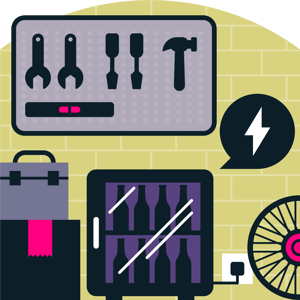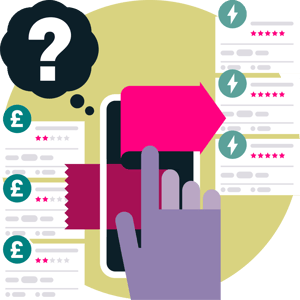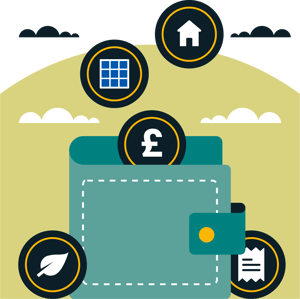Don't wait until winter: Here's how you can get ahead of the energy price cap increase
With household energy costs soaring and bills set to hit record highs of £3,549 a year when the price cap rises this October, now's the time to avoid paying more than you need to this winter.
Take these 5 steps to keep your usage at rock bottom and save money on your rising bill.
1. Cut your Phantom Load
There are some things like fridges and freezers that must stay on all the time. The best advice for these appliances is to focus on efficiency and running costs when it’s time to replace them. An older or less efficient model could easily cost twice or three times as much to run as the most efficient models.
You may already be aware that appliances continue to drain energy, even when left on standby. However whilst it’s sensible to turn things off rather than leave them on standby, the bigger energy stealers are the things that are left on all the time, either intentionally or accidentally. You might leave them on because you don’t realise how much they’re costing to run, or accidentally because you’ve just forgotten about them.
Things that fall into these categories include computers, media servers and set-top boxes, plus easy-to-forget things like underfloor heating, heated towel rails and extra drinks fridges. Collectively these make up your ‘Phantom Load’.

Understanding Phantom Load and what’s contributing towards it is vital, as homeowners can often make simple changes that can lead to significant savings. In fact, Loop research has revealed the average household could be wasting £368 on their Phantom Load annually, with this set to increase along with the price cap. As wasted energy contributes to around a third of an average energy bill, it’s a simple way to make a big impact on your bill.
Dr Steve Buckley, Head of Data Science at Loop, says:
“There’s no doubt that the rising cost of energy bills is scary for consumers, but there are still things people can do to cut rising costs. The cheapest energy is the energy you don’t use after all! Using a free app like Loop can help you understand how your household uses energy and empower you to make smart decisions about using less.”
2. Take advantage of the support available
Many households will be struggling to pay their energy bills, even with the Government Energy Bills Support Scheme offering a £400 rebate. But there is some help available - depending on the bill payers' circumstance, the support available includes:
- Government Energy Bills Support Scheme
- Cold Weather Payments
- Warm Home Discount,
- Winter Fuel Payments
- Energy Grants from suppliers
- Hardship Funds
Read more in our guide: Struggling to pay your energy bills? How to get help
Dr Steve Buckley, Head of Data Science at Loop, says:
“Many people will feel they have done everything they can to reduce their energy consumption but will still struggle to pay their bills this winter. The situation is only going to get worse with another energy price cap increase in January 2023. Our advice is don’t wait until the bill arrives to seek help.”
If you pay monthly, it might seem strange if your supplier is increasing the amount they take over the summer when your gas bills in particular are likely to be lower. The logic here is to spread the increased cost of your payments over a longer timescale to smooth the impact of likely increases later in the year. Think twice before cancelling that direct debit as spreading the cost is likely to make it easier to pay for those higher winter bills.
3. Fixing your tariff
There are different types of tariffs and it’s sometimes hard to understand which will be best for you.
As many as 70% of households are on price-capped variable tariffs. The price you pay for each unit of energy with these tariffs is variable - it can go up and down - but can never be higher per unit than the price cap level.
According to Which, for almost all households this is currently cheaper than a fixed tariff. As the name implies, a fixed tariff sets the price of your energy for a set period of time and offers surety over standing charges and unit costs. In a normal energy market, these fixed tariffs are generally the cheapest option but we’re not in a normal energy market, unfortunately. The small number of fixed tariffs that are currently available are all more expensive than the price cap.

So why would you even consider them? Because with energy prices as volatile as they are and with large increases to the Price Cap in October, some households will be better off switching to a fixed deal even if it’s more expensive in the short term as it offers protection against possible future increases. Whether it makes sense for you will depend on your current deal, your patterns of energy use and your attitude to risk! For some, just having certainty over energy bills for the next 12 months is a price worth paying.
Dr Steve Buckley, Head of Data Science at Loop, says:
“The benefit of fixed tariffs is that they offer predictability which some billpayers are looking for right now. Even if a fixed deal is more expensive right now, it may not be come winter. Each household's situation is different so billpayers need to consider how their current tariff compares to fixed deals now and after the price cap rise in October.”
4. Don't misinterpret what 'Price Cap' means but if you measure it you can control it
The term ‘Price Cap’ is a bit misleading. It’s not like an ‘all-you-can-eat meal deal. The more energy you use, the more you pay. If you’re on a variable ‘price cap’ tariff, it’s important to remember that the price cap only means that the standing charge and unit cost are capped, not how much you pay. The more you use, the more you pay. It’s also important to understand that the price cap doesn’t apply to fixed tariffs.
Previously the Price Cap was adjusted twice per year - in April and October - but Ofgem has recently changed this to review it four times per year, starting this October. This could be beneficial if the underlying energy costs reduce but also means upward adjustments can happen more regularly.
Monitoring how you use energy can help avoid a nasty shock when the bill or monthly statement arrives. Research from Oxford University’s Environmental Change Institute suggests using an energy monitor could help you use between 5-15% less energy a year. This tallies with Loop users who, on average, cut their energy usage by 10%!
Dr Steve Buckley, Head of Data Science at Loop, says:
“Key to reducing your energy bills is monitoring what you use. After all, you can’t control what you don’t measure. You can use free third-party apps like Loop to unlock your smart meter data. The smartphone app doesn’t require a separate in-home display and Loop can provide you with much more insight about your energy use than a smart meter alone. For example, we tell you if your usage and Phantom Load are low, medium or high and whether you’re using more or less than in the past, a great incentive for many to change their energy behaviour.
5. Now's the time to reconsider solar
With the eye-watering cost of the average energy bill, many are looking for ways to cut theirs and are coming to the same conclusion after crunching the numbers for solar - it now makes financial sense for more households, reducing their bill in the long term.

Installing solar panels can help offset rising electricity costs with cheap, clean energy and the financial incentives have never been stronger as the payback time has reduced by 30% since April’s price cap rise.
They’re a good investment to future-roof your energy bill and cut your household’s carbon emissions - by 1.6 tonnes each year!
If you’re exploring solar panels for the first time and are considering whether they could work for your home, our guide: Is solar right for me? can help. The free Loop app also offers a unique Solar Simulator feature to test how solar panels could work for individual households.
Dr Steve Buckley, Head of Data Science at Loop, says:
“For anyone thinking about installing solar, the financial benefits are there to see. Homeowners can use our Solar Simulator to see how they could benefit financially from installing solar. Using your energy data, details about your house and weather information, via the Loop app, we can show you the actual difference solar power could make to your monthly bills and your reliance on grid energy.”
• • •
With Loop, you can find out how you use electricity, then make smart decisions about using less.
Got a smart meter? Great news! Link the Loop app and enjoy full access to all Loop benefits for free, no purchase required.








